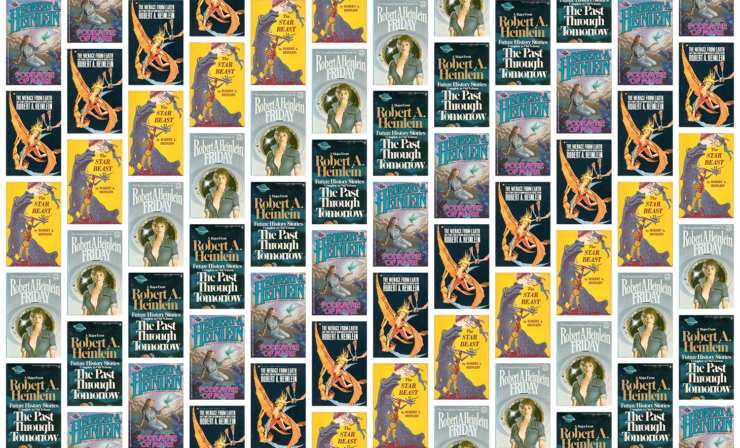People complain about the oddest things, sometimes; apparently including too many women authors in a given article is an affront to those who prefer a more macho approach to SF. Never let it be said that I don’t respond to criticism! To help reassure that type of reader, here are five ineluctably masculine works by the Dean of SF, Robert A. Heinlein.
“Delilah and the Space Rigger” (1949)
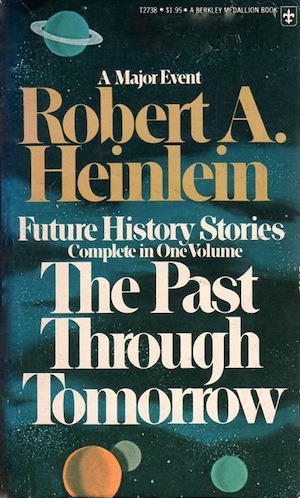
Twenty-two thousand three hundred miles above the Earth, Space Station One is the very first geosynchronous space station. One might expect technical challenges to be the main concern—in fact, it’s staff who are the worse headaches for project head “Tiny” Lawson. Staff like G. Brooks McNye. Hired on the strength of impressive credentials, McNye reveals on arrival at the station that she has the shocking habit of being a woman.
Tiny immediately sees the best use for McNye: dispatched back to Earth on the grounds that she is a woman. The other workers don’t see it that way; she has already proved herself as an engineer. They threaten to resign en masse unless McNye stays. Tiny gives in.
One of Tiny’s concerns is that having a single woman in a crew of several hundred men could be distracting. It’s interesting that his preferred solution is to get rid of the woman, not seek out and hire a whole bunch more. The usual response to this suggestion is to claim that women aren’t as good as men. Which McNye proves wrong.
The Star Beast (1954)
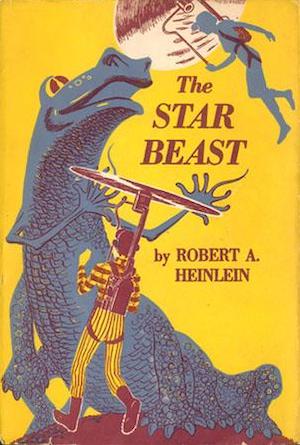
Legacies can be troublesome. In the case of high-schooler John Thomas Stuart XI, his legacy includes Lummox, an alien of unclear origin brought to Earth by John Thomas’ star-faring great-grandfather. Once small, cute, and adorable, Lummox has grown into a poorly disciplined metal-eating behemoth. Neighbors are not only complaining. They’re doing their best to have Lummox destroyed.
John Thomas is determined to save his pet, but can’t come up with a viable strategy. Luckily for the boy, Lummox is effectively invulnerable. Even better, emancipated teen Betty Sorenson is smitten with John Thomas. Betty is more cunning than her somewhat hapless boyfriend. When opportunity beckons, Betty does not hesitate to grab on with both hands. This is providential not merely for the boy, the girl, and the alien, but for the Earth as a whole, whose fate turns out to depend on saving Lummox.
If there’s a moral to this story, it’s probably “double-check the provenance of any alien babies you want to kidnap because its parents may be able to reduce the Earth to a cinder.” Powerful aliens are not that rare in Heinlein so any Heinlein character who doesn’t check for them is careless. What does stand out is that the plot depends on the insight of a sympathetic bureaucrat named Mr. Kiku. One does not see many characters of that sort in SF.
“The Menace from Earth” (1957)
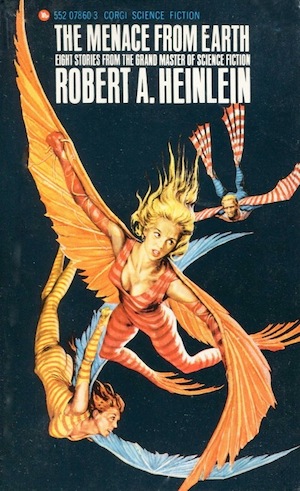
Holly Jones is an aspiring spaceship engineer. “Jones & Hardesty, Spaceship Engineers” will have to wait until Holly graduates university. Still sixteen, she has to settle for playing tour guide to rich people from Earth. The Moon offers unearthly delights, but also exciting new ways to die. Diligence is required.
Miss Brentwood may doom Jones & Hardesty, Spaceship Engineers before it is even founded. To Holly’s alarm, eighteen-year-old Jeff Hardesty—the “Hardesty” in Jones & Hardesty—seems alarmingly distracted by the older, quite fashionable Earth woman. Engineering history and other stuff is at stake, in a contest whose parameters Holly finds difficult to define.
People who have read ahead in Heinlein’s Future History know there’s bad news and good news for Holly. The bad news is Holly and Jeff won’t build and crew the starships of which Holly dreams. There is a lengthy hiatus in space travel coming soon and the first starships won’t appear until the couple is old or dead. The good news is that this means Holly and Jeff won’t end up on either Vanguard (which devolves after launch into a community of fanatical mutant cannibals) or New Frontiers (which gets hijacked by feisty octogenarians).
Podkayne of Mars (1963)
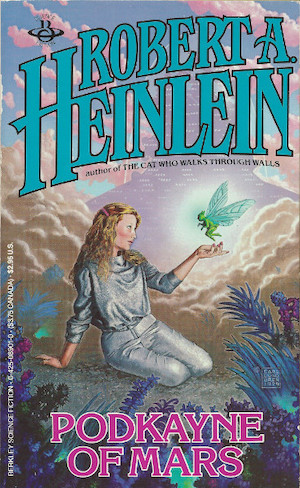
When the inadvertent decanting of her frozen siblings threatens Podkayne and her brother Clark’s space holiday, their uncle Tom steps in to save the day. Tom will play chaperone to Podkayne and Clark, allowing the siblings to tour Venus and Earth as planned, while Mom and Dad stay home with their unscheduled triplets. Everyone wins!
There is just one catch. Uncle Tom is Senator Tom Fries. For Senator Fries’ enemies, the trip is a prime opportunity to blackmail or murder the Senator. The Senator’s niece and nephew would make ideal bargaining chips, if they don’t become collateral damage.
It’s possible that Podkayne does not always make the best decisions in this book. However, brother Clark is a budding sociopath who considers smuggling atomic bombs and the occasional homicide to be acceptable behavior. Uncle Tom is the sort of person who, not having kids of his own, uses his niece and nephew as meat-shields then lectures their mother for her failures as a mother. Podkayne does not come close to making the worst decisions in this novel. It’s all relative, and her relatives are terrible.
Friday (1982)
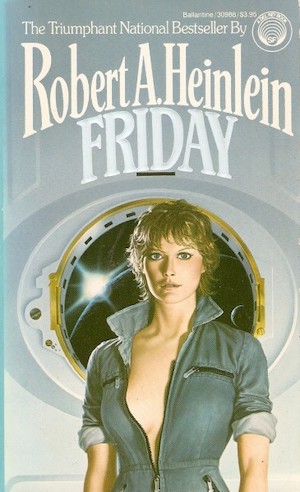
Friday is an artificial person, designed and created to serve. “Kettle Belly” Baldwin seems happy to let Friday thinks she’s his free agent but her duties expose Friday to horrific abuse and personal risk. Friday is a valuable asset for Baldwin but it seems clear that whatever Baldwin might say about his feelings towards Friday, she’s an expendable asset.
What begins as a mission gone wrong quickly develops into a continental-scale conflict. This is no doubt terrible news for all the people who cannot flee what amounts to war. Friday loses everything but in the process, finds she might be able to escape from Earth…if the employers offering her a ticket off-world don’t simply dispose of the Artificial Person once her usefulness is over.
There are a number of schools of thought about Friday as a protagonist and about the ending of the novel. I lean towards seeing her as someone who has been so beaten down by events and even by the people ostensibly on her side that she can’t imagine a happy ending or tell ally from exploiter.
***
I hope this satisfies the concerns of anyone worried that men don’t get nearly enough attention in science fiction. If not, I am sure there are many more Heinlein stories along the lines of the ones above. Indeed, I suspect commenters will name them in comments, which are, as ever, below.
In the words of fanfiction author Musty181, four-time Hugo finalist, prolific book reviewer, and perennial Darwin Award nominee James Davis Nicoll “looks like a default mii with glasses.” His work has appeared in Interzone, Publishers Weekly and Romantic Times as well as on his own websites, James Nicoll Reviews (where he is assisted by editor Karen Lofstrom and web person Adrienne L. Travis) and the 2021 and 2022 Aurora Award finalist Young People Read Old SFF (where he is assisted by web person Adrienne L. Travis). His Patreon can be found here.










